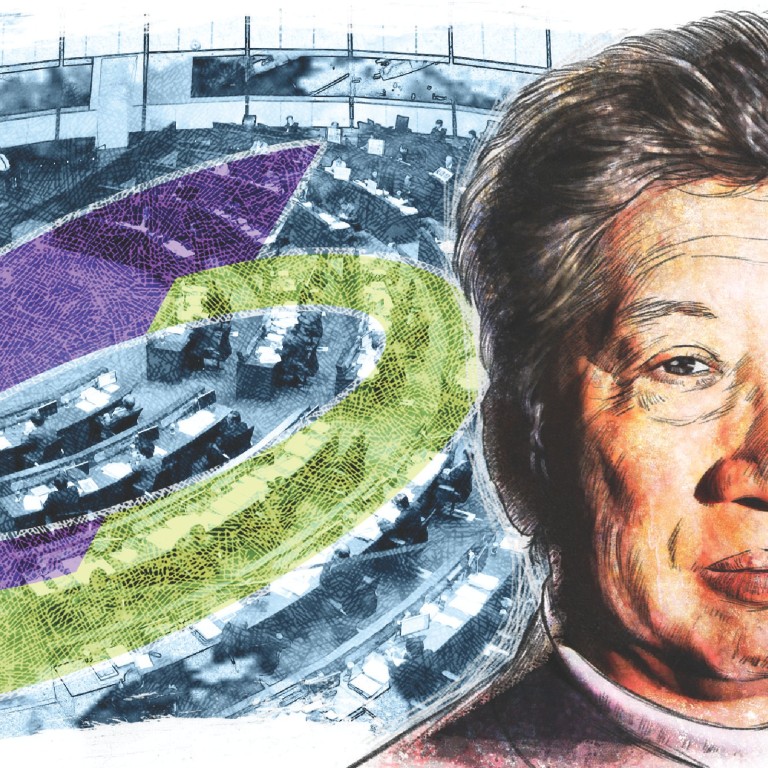
2017 debate widens rift between Ronny Tong Ka-wah and Civic Party
The lawmaker's electoral plan for 2017, which ignores public nomination, may be the final straw for his strained relationship with the Civic Party
To quit or not to quit the Civic Party? That is the question Ronny Tong Ka-wah faces almost every time he enters the city's heated electoral reform debate.
This year is no different, especially after the relatively moderate lawmaker put forward a compromise reform proposal which would not allow the public to nominate chief executive hopefuls for the 2017 poll - contrary to pan-democrats' demands.
Tensions between the Civic Party and Tong escalated after he publicly criticised pan-democrat calls for a three-track nomination system for chief executive candidates - including a nominating committee as well as public and party nominations - as unreasonable.
"I did not betray Hongkongers," Tong, sounding close to tears, said in response to criticism of his own reform proposal. "It is especially heartbreaking to be blamed by pan-democrat allies."
He got emotional, he later explained, because his treatment reminded him of the experience of Szeto Wah, the late democracy icon and central figure in the Democratic Party.
"During the 'de facto referendum' movement, Szeto - who opposed the movement and supported the electoral reform proposal [for last year's Legco elections] - was told that his cancer cells had spread to his brain," Tong said. "But at least his party stood by his side backing him. I do not have this luck today."
Tong put forward his electoral reform plan in October. Ignoring public nomination, it focused on increasing the representativeness of the nominating committee. He suggested expanding the current 1,200-strong Election Committee, by including all popularly elected district councillors, to form the nominating committee.
He also called for replacing some corporate votes - held by business, trade and professional groups and other such bodies - with individual ballots.
Dennis Kwok was the only Civic Party lawmaker to offer support for the plan.
"If [Beijing] accepts my proposal, two-thirds of the members of the future nominating committee would be elected by Hongkongers via one man, one vote," Tong said.
Some pan-democrats accused him of making concessions too soon, but Tong believes that the earlier issues are discussed the better.
"The more complicated the proposal is, the sooner it should be raised for discussion," he said.
Indeed his proposal may have come too late, he said, as some Hongkongers had already inextricably linked universal suffrage with public nomination.
"At least that's the belief of [student-led group] Scholarism, as if any proposal without public nomination is not universal suffrage," he said.
"If that's the case, I don't think we have the chance to implement universal suffrage at all."
He said pan-democrats should not neglect the fight for a broadly representative nominating committee.
Tong studied law at the University of Hong Kong and graduated with first-class honours in 1972. He was called to the Hong Kong Bar in 1975.
But it wasn't until 1999 that he first entered the political arena, by taking the helm of the Hong Kong Bar Association.
In 2002, he co-founded the Article 23 Concern Group, with former Bar Association chairmen Audrey Eu Yuet-mee and Alan Leong Kah-kit, to oppose the government's attempt to implement Article 23 of the Basic Law - attempts that were seen by many as a threat to civil liberties and basic freedom.
Tong was directly elected to the Legislative Council in 2004 and has kept his seat ever since.
Despite being one of the founding members of the Civic Party in 2006, Tong has sometimes - if not always - had an ambivalent relationship with his party.
During the last political reform battle in 2010, Tong was one of the six representatives of the Alliance for Universal Suffrage - a coalition of moderate democrats - and the only Civic Party member that held talks with the central government on political reform.
Tong supported the Democratic Party's "one-person, two-votes" proposal to allow the public a vote last year on five new seats in the Legislative Council's new functional constituency representing district councils. He eventually toed his own party's line, and voted against the plan.
But his rift with the Civic Party widened again over the copyright ordinance saga last year - where the party refused to back a moderate amendment aimed at protecting satirists from prosecution that was proposed by Tong, amid criticism from internet users.
"I would thoroughly consider [whether I should quit the party]," he said at that time. "I have only humiliation but no glory [for staying in]."
Lawmaker Albert Ho Chun-yan, of the Democratic Party, said he did not doubt Tong's integrity.
"Tong had made it clear that he would not accept any proposals that included screening [of chief executive candidates]," said Ho, adding pan-democrats should not reject any reform proposal at this stage.
Standing at the crossroads of political reform again, Tong couldn't hide his disappointment. He believes the Civic Party may be deviating from its founding philosophies.
Asked if he would quit the Civic Party if his colleagues decided to veto any proposal that did not include public nomination, Tong said he might vote against the party's line.
"I believe my party would accept my proposal … but they are reluctant to say so in public," he said. "I hope I do not have to consider [quitting]."
RONNY TONG
63
Graduated from University of Hong Kong with a first-class honours degree in law
Obtained a Bachelor of Civil Law from Oxford University; called to English Bar
Called to Hong Kong Bar
Appointed as Her Majesty's Counsel and later the Senior Counsel
Chairman of Hong Kong Bar Association
Co-founded Article 23 Concern Group
Co-founded Civic Party
Entered Legislative Council via New Territories East direct election, re-elected in 2008 and 2012, respectively

